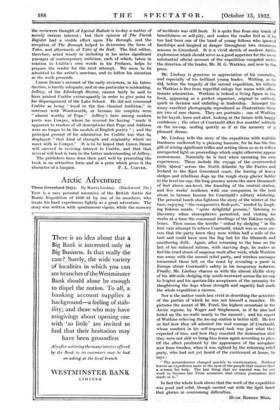Arctic Adventure
Those Greenland Days. By Martin Lindsay. (Blackwood. 15s.) Tnis is a racy personal- narrative of the British Arctic Air Route Expedition of 1930-31 by one of its members, who treats his hard experiences lightly as a great adventure. The story was written with spontaneous vigour, while the memory of incidents was still fresh. It is quite free from any touch of boastfulness or self-pity, and makes ⢠the reader feel as if he too had been one of the band of young fellows who ignored hardships and laughed at danger throughout two strenuous seasons in Greenland. It is a vivid sketch of modern Arctic exploration which should serve as a good appetizer for the more substantial official account of the expedition compiled under the direction of the leader, Mr. H. G. Watkins, and now in the press.
Mr. Lindsay is generous in appreciation of his comrades, and especially of his brilliant young leader. Writing, as he did,- before the tragedy of the second expedition, his tribute to Watkins is free from regretful eulogy but warm with affec⢠tionate admiration. Watkins is indeed a living figure in the book, appearing as a perfect organizer, original in outlook, quick in decision and unfailing in leadership. Amongst the many excellent photographs reproduced as illustrations there are two of rare charm. They are portraits : one of Watkins in his kayak, keen and alert, looking at the future with happy confidence ; the other of Courtauld after five months' solitude on the ice-cap, smiling quietly as if at the memory of a pleasant dream.
Mr. Lindsay tells the story of the expedition with realistic frankness mellowed by a pleasing humour, for he has the fine gift of seizing significant trifles and setting them so as to reflect unexpected light on proceedings which might otherwise appear monotonous. Naturally he is best when narrating his own experiences. These include the voyage of the overcrowded little ' Quest ' across the North Atlantic by the FarOes and Iceland to the East Greenland coast, the forcing of heavy sledges and rebellious dogs up the rough steep glacier ladder to the level ice-cap, the long journey across the snow thousands of feet above sea-level, the founding of the central station, and five weeks' residence with one companion in the tent about to become famous for Courtauld's solitary wintering. The personal touch also lightens the story of the winter at the base, enjoying " the comparative flesh-pots," tended by laugh- ing Eskimo maids, " quite delightful persons," listening to Daventry when atmospherics permitted, and visiting for weeks at a time the communal dwellings of the Eskimo neigh- bours. Then comes the terrific " ordeal by sledging " in the first vain attempt to relieve Courtauld, which was so near suc- cess that the party knew they were within half a mile of the tent and could have seen the flag but for the blizzards and smothering drift. Again, after returning to the base on the last of his reduced rations, with starving dogs, he makes us feel the cruel strain of suspense week after week, while Watkins was away with the second relief party, and wireless messages tormented those left on the coast by revealing a panic in Europe about Courtauld's safety in his temporary isolation. Finally, Mr. Lindsay charms us with the almost idyllic story of his 400-mile sledging trip south-westward across the ice-cap to Ivigtut and his spartan-like acceptance of the necessity for slaughtering the dogs whose strength and sagacity had made the whole expedition a success.
Nor is the author much less vivid in describing the activities of the parties of which he was not himself a member. He pictures the ascent of Mt. Forel, the highest mountain in the Arctic regions, by Wager and Stephenson, as if he also had toiled up the ice-walls nearly to the summit ; and his report of Watkins relieving the ice-cap station is better still. He lets us feel how they all admired- the cool courage of Courtauld, whose conduct in his self-imposed task was just what they -eXpected of him, and how they resented the insinuation that they were not able to bring him home again according to plan. Of the effect produced by the appearance of the aeroplane sent from Sweden, when it was sighted by the-returhing relief party, who had not yet heard of the excitement at home, he says : " The astonishment changed quickly to consternation. Nothing lowers an expedition more in the eyes of⢠the.people that matter than a scream for help. The last thing that we wanted was for our work to become the Press sensation that certain journalists had made of it."
In fact the whole book shows that the work of the expedition was good-and solid, though carried out with the light heart that glories in overcoming difficulties.
HUGH ROBERT MILL.


























































 Previous page
Previous page